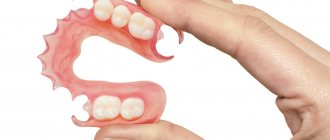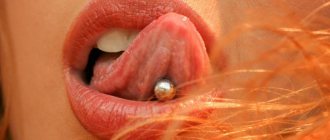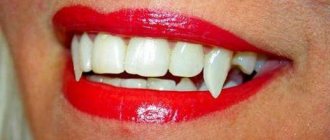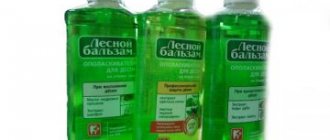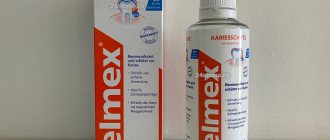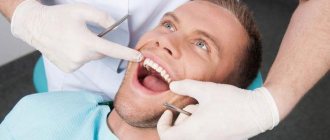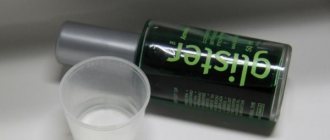Daily hygiene of teeth and gums includes rinsing the mouth with special solutions. Rinse aids can be purchased at pharmacies, or you can prepare them yourself. Their use ensures cleaning of the oral cavity in hard-to-reach places, freshening of breath and destruction of certain types of pathogenic microorganisms. You can easily make a mouthwash with your own hands, and this will be the right decision when you are intolerant to chemical components and want to make your dental hygiene as safe as possible.
How to make a mouthwash
To make a simple mouthwash you will need a few basic ingredients.
Namely:
- sea salt, which has a bactericidal effect and is rich in minerals;
- alcohol or water tincture of herbs;
- soda, which effectively cleanses bacterial plaque;
- essential oils that have good antibacterial and anti-inflammatory effects.
“Store-bought” mouthwashes contain substances such as thymol and methyl salicylate.
These are antiseptics with a toxic effect, which are contraindicated during pregnancy and are not intended for oral administration.
If accidentally swallowed, adverse reactions may occur, especially when there are diseases of the gastrointestinal tract. Rinsing your own has many benefits. You can select each ingredient yourself, which is especially important for allergy sufferers. This rinse is natural, it does not contain preservatives or dyes, which means side effects are minimized. It is also a very economical option, which is good for large families.
A DIY rinse can be a bleaching agent if you add a little apple cider vinegar or lemon juice to it. To prepare, you need to take a glass of water, a spoonful of hydrogen peroxide, 3 drops of eucalyptus oil, a teaspoon of calendula tincture. Hydrogen peroxide is first added to a glass of water, then the remaining components. The mixture is thoroughly mixed, after which you can rinse your mouth.
For an antibacterial rinse, you will need an infusion of chamomile or thyme; a decoction of oak bark is also good.
Recipe for making an antibacterial mouthwash:
- You will need two tablespoons of chamomile, a teaspoon each of salt and soda, 4 drops of tea tree oil.
- Chamomile is poured with boiling water, then filtered.
- Salt, soda and ether are added to the broth.
A good natural antiseptic is aloe, from the juice of which you can make a mouthwash. To do this, you need to mix 100 ml of mineral water, 20 drops of mint oil, a spoonful of citrus juice, a spoonful of oak bark infusion and 100 ml of aloe juice.
Ecological trail
There are two main benefits to making homemade cosmetics. One feature is maintaining health, since you only use cosmetics that do not contain chemicals. Remember that the body absorbs everything through the skin or “evaporation” from cosmetics.
The second reason homemade beauty products are effective is that you reduce the amount of waste generated and live a more eco-friendly lifestyle. You do not buy a new plastic bottle, which subsequently decomposes for a long time, but from natural substances you create your own cosmetic product, which is again placed in the same glass container. This way you won't create unnecessary waste or burden the planet with more plastic.
If you make homemade cosmetics from substances such as essential oils, etc., which come from organic farming, you can be sure that you are going the right way and thinking about our planet.
With essential oil
It is better to prepare rinses with essential oils in alcohol for long-term storage.
There are 2 simple recipes:
- Mix 200 ml of vodka, 20 drops of mint oil, 15 thyme, 5 sage and 5 myrrh. A teaspoon of the mixture is added to a glass of water before each rinse.
- Mix 200 ml of vodka, 10 drops of lemon juice, 15 tea tree oil, 10 lavender. This product also has a whitening effect. Applies like the previous one.
A good antibacterial rinse would be one with tea tree oil and mint. To prepare, you need to take 200 ml of water, 5 drops of mint oil and 5 tea tree oil. This product will give you a feeling of freshness and cleanliness.
Other recipes for natural alcohol-based mouthwashes:
- 200 g of vodka is mixed with 500 ml of water, 30 ml of glycerin and 10 ml of aloe juice are added to the solution. The mixture is brought to a boil, then 20 drops of mint oil are added.
- Add 5 drops of mint oil and 5 mg of cinnamon powder to a glass of vodka. This remedy should sit for several days. After preparation, the mixture is filtered and used for rinsing.
- Mix two teaspoons of mint and sage, add 5 tablespoons of red sandalwood powder. The mixture is poured with a liter of water and 200 ml of alcohol. The product is infused for a week in a dark place.
- The container contains 50 ml of water, 100 ml of vodka, 15 drops of lemon juice and 20 bergamot oil. The contents are shaken and infused for 7 days. Before use, a teaspoon of infusion is diluted in 50 ml of water.
Indications for use
The use of medicinal or hygienic medicinal liquids will have a positive result with such manifestations as:
- weakened or bleeding gums;
- development of caries;
- stomatitis;
- the appearance of a soft bacterial plaque;
- formation of mineralized deposits;
- increased sensitivity of teeth;
- bad breath;
- discomfort after surgical procedures.
If desired, you can use a rinse not only the oral cavity, but also removable dentures.
Antiseptic solutions are also indicated for people with installed fixed orthodontic structures.
Terms of use
How to use mouthwash correctly:
- It is better to prepare solutions daily to get maximum benefit from them.
- Rinse is carried out after brushing your teeth.
- The oral cavity should be rinsed for about 2 minutes, collecting 15-20 ml of solution.
- The product should be stored in a dark place out of reach of children.
- For half an hour after rinsing, you do not need to eat anything to allow the medicinal components to act on the mucous membranes and teeth for some time.
- Under no circumstances should spoiled products be used.
For those who are experiencing toothache or inflammatory gum disease, natural rinses with iodine and salt are suitable. Soda is a natural antiseptic, and it also removes bacterial plaque well when there is an ulcer or aphthae. When there are periodontal pathologies, it is more effective to use alcohol tinctures, which can be used to rinse your mouth daily throughout the entire treatment period.
Alcohol rinses are recommended for aphthous stomatitis and various forms of gingivitis. They are contraindicated during pregnancy and for young children.
As for mouthwashes for children, they can be used from the age when the child understands that the liquid must be spit out. Before this period, the mucous membrane should be wiped with a cloth soaked in the solution.
Benefit
For your information! Dentists recommend regularly using medicinal solutions to cleanse the oral cavity for all patients, provided there are no contraindications.
After all, such products have many useful properties. Among them:
- protecting teeth from caries;
- preventing the formation of tartar;
- fight against bleeding gums;
- maintaining fresh breath;
- gentle whitening of tooth enamel;
- reduction of tooth sensitivity.
Rinses help avoid suppuration of postoperative wounds .
Therefore, many specialists prescribe their patients the use of therapeutic and prophylactic solutions after tooth extraction or other operations.
It is worth noting! Rinsing helps prevent infection from entering the wound and promotes rapid healing.
Despite all the beneficial properties of rinses, mouthwashes cannot replace a toothbrush and toothpaste.
For this reason,
it is necessary to use solutions as an additional means for caring for the oral cavity .
conclusions
Based on the above, we can come to the following conclusions:
- when choosing a mouth rinse, it is important to consider the presence of contraindications for use;
- to purchase a suitable product, you should pay attention to what effect the solution has and read its composition;
- Rinse liquids for adults and children differ in their composition. Therefore, you need to buy age-appropriate products;
- purchased antiseptic solutions can be replaced with mint infusion prepared at home.
Antibacterial agents
Antibacterial rinses suppress the growth and activity of pathogenic microorganisms that contribute to the development of caries.
They reduce the formation of soft and mineralized plaque and reduce gum bleeding.
Among the many options, dentists highlight:
- PresiDENT Professional.
- Listerine Total Care.
- Lacalut Sensitive.
- Colgate Plax Comprehensive protection.
Remember! You can use antibacterial rinses based on chlorhexidine or containing triclosan for two weeks, after which you should temporarily stop using them.
Strong alcohol
In the Middle Ages in Europe, teeth were cleaned with sand, crushed coal, chalk, and sometimes brick chips. For rinsing, they used herbal infusions or simply salt water.
More sophisticated methods were used by monks and other educated people. In 1363, Guy de Chauliac created a recipe for a honey-based teeth cleaner. Ten years later, the “toothpick elixir of the Benedictine fathers” was proposed by Father Boursault (recipe unknown). Giovanni da Vigo recommended a mixture of pomegranate and wild olive.
In the 1600s, science rapidly accumulated medical knowledge. William Harvey discovered the circulatory system, Antonie van Leeuwenhoek described cells in detail, and Giovanni Battista Morgagni was recognized as the father of pathology. Dentistry was no exception. Van Leeuwenhoek discovered that harmful bacteria in the mouth were destroyed by vinegar or strong brandy. From now on, many people took advantage of the opportunity to drink alcohol and disinfect their mouths at the same time.
Remedies for gum inflammation
Therapeutic rinses , which have an anti-inflammatory effect, help relieve inflammation, stop bleeding, strengthen the gums and prevent the development of periodontitis .
You should know! The most effective antiseptic solutions in the treatment of gum disease are:
- Asepta Active.
- Parodontax Extra.
- Colgate Total Pro Gum Health.
- Splat Complete.
- Forest balm with sage extract.
- Listerine Expert Gum protection.
User reviews
Elena Perova, 24 years old.
I started using mouthwash recently when I noticed that tartar had appeared on my teeth and the enamel had acquired a yellowish tint.
For the first time I purchased a product from ROKS with a whitening effect, but it made my teeth more sensitive.
Now I use Listerine and I can say that it suits me much better. After two weeks of use, the teeth became lighter, the stone is slowly being removed. And the main thing is that there are no unpleasant sensations during rinsing.
Vadim Kurkin, 32 years old.
I don’t neglect oral hygiene and always try to brush my teeth thoroughly, and I also visit the dentist regularly.
He advised me to use Splat Active mouthwash. The liquid does not contain harmful components, has a rich herbal aroma and is inexpensive.
The purchase is very useful. After all, the rinse aid easily removes plaque remaining after cleaning, copes with unpleasant odors and heals the mucous membrane after burns or mechanical injuries.
Orange, cinnamon, clove and anise flavoring
One of the warmest winter scents. Many people make fragrant “hedgehogs” from oranges or tangerines and cloves. This flavor works great for a week. The version with a can is longer-lasting.
Cut the orange into slices, add a few cinnamon sticks, 8-10 cloves and a few anise stars. The ratio can be changed depending on which scent you like best.
Fill the jar with water. In order for the mixture to release its aroma, it must be heated (an important rule for all water-based flavors). To do this, you can use a fondue pot, USB drink warmers, teapot stands with candles, or just a radiator.
Features for adults and children
For young children, manufacturers have developed rinses without alcohol or aggressive components that can dry out the mucous membrane or cause an allergic reaction.
Due to an unpleasant or intense taste, children may refuse to use the product.
Therefore, hygiene solutions for babies have a light aroma and pleasant taste.
The choice of rinses for adults should be treated no less responsibly, because the wrong solution will not bring any benefit and will aggravate the situation .


